Featured
Posters, Billboards “War” in Lagos
Published
2 years agoon
By
FocusMag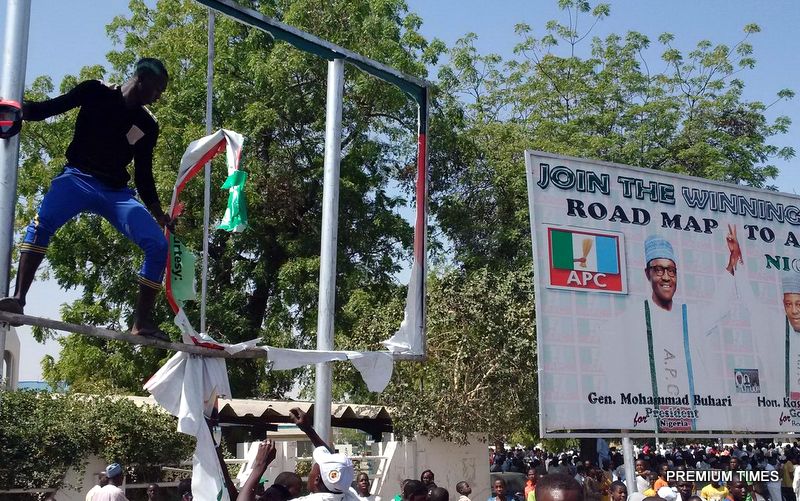
“In an open electoral contest, publicity materials, such as posters, outdoor bill boards and large format banners, announce the candidates, and to a large extents, their parties. They therefore, play a huge role in the eventual outcome of such election”. This is how Dr. Akin Adetunji a Lagos-based voluntary campaigner surmised the effectiveness of publicity materials in a general election.
But most unfortunately, many of the eighteen parties registered by the Independent National Electoral Commission (INEC) do not see it this way. With less than seventy-five days to the commencement of the next general elections, slated for February 2023, only a few of the parties can be noticed by means of outdoor publicity materials in Lagos State.
Dr. Adetunji continued: “A party or candidate who cannot erect outdoor bill boards, cannot mount large format banners, or even paste posters, may sound unpopular, and therefore tagged unserious by the electorate. It is by ways and means of these materials that people get familiarized with the parties and their candidates, and even for passers-by to feel their presence”
As the kick off date for the general elections slated for February 2023 draw nearer, the eighteen registered parties have intensified the battle for the over seven million votes in Lagos State. However, as at the time of filling this reports only two of the eighteen parties, only two, the All Progressives Congress (APC) and Peoples Democratic Party (PDP), have flagged off their campaigns in the State.
And more surprising is the presence of the parties by means of posters, large format banners and outdoor publicity materials. Throughout the length and breadth of the State, www.focusmagazineonline.com checks revealed that it is only the ruling party in the State, APC, that is visible. Two others, the PDP and LP are “timidly visible”, according to an administrative officer in the State Secretariat of the APC, in Ogba, Ikeja. Then we have a sprinkling of Action Alliance (AA), and few others.
In the State, Labour Party (LP) started vibrantly and brightly. It did a road show in three selected areas of the State in October. The man-march made a huge impact, but the party have since recoiled into its shell. There are few posters of its candidates, Mr. Peter Obi and Mr. Gbolahan Rhodes-Vivour around the State, but they a far, and few in-between. The lull in the activities of the party, a source at the State Secretariat in Oregun, Ikeja said “is due to the internal crises within the party. The gubernatorial tussle between El Salvador and Rhodes Vivour is yet to be settled, and so the many candidates for the parliamentary seats”.
While the BOOT Party (BP) said it would be reaching out to the public through its weekly press engagement. Mr. Wale Oluwo , a former Commissioner for Energy under the governorship administration of Mr. Akin Ambode, said the his party, would base its campaign on a weekly media event to proffer solutions to the challenges confronting Lagos State and Nigeria, particularly with regard to the 2023 elections. The media event is named: on BOOT Party Solutions Series. Mr. Oluwo has since Wednesday (30 November) inaugurated the media campaigns in Lagos. However, www.focusmagazineonline.com is yet to sight his poster or outdoor bill board anywhere in the State.
For a first time visitor, Lagos State may be considered huge. This is yes and at the same time no. The total land mass of the State is less than 4,000 square kilometre. Therefore, covering the State with outdoor publicity materials should not be an issue. The land mass is small, but the voting population is huge, very huge to be abandoned.
Although, the entire land area of Lagos may not pull much weight when compared with some others, particularly the adjourning neighbouring states of Ogun and Oyo, but the huge voting population, the human mass, certainly does. A State with a land mass of less than 4,000 square kilometres, but with an astounding population of over 20 million, should mean a lot to any political party desirous of making a good impact at the general elections, not only in the State, but in the federal elections. Lagos, as a State, is both the economic and political heart-beat of the country, Nigeria. It is a State where all tribes, perhaps, every family in the country, conglomerate, at least have a foothold.
The voting population of the State is robustly high and besides, the most vibrant, enlightened, educated and dynamic in the country.
Reviewing the voting details in June, 2022, Mr. Segun Agbaje, the Lagos State Resident Electoral Commissioner, puts the total number of registered voters in Lagos state before the commencement of the Continuous Voter Registration (CVR) at 6,570,291, saying “if we add the new registrants, we have about seven million registered voters.”
He said if the number of new registrants in the ongoing continuous voter registration (CVR) is added to the current number of registered voters in the state, this will amount to around seven million.
He continued: “In Lagos state, as of Monday (July 18), those who registered online are 640,560 but many of them have not completed registration. Those who have completed the registration exercise are 451,156,” he said.
While the State Residential Commissioner for Independent National Electoral Commission (INEC), Olusegun Agbaje, says there are around seven million registered voters in Lagos. He however, insisted that “everybody cannot be captured but those who come to us will be registered.”
Nationally, the Chairman of the Independent National Electoral Commission, (INEC), Prof. Mahmood Yakubu, gave the numbers of total registered voters across the country as 93.5m. “The 9,518,188 new voters have been added to the existing register of 84,004,084 voters. The preliminary register of voters in Nigeria now stands at 93,522,272’’, he revealed.
Of this figure, analysis of the preliminary register by www.focusmagazineonline.com revealed that Lagos, Kano, Kaduna, Rivers, Katsina and Oyo states have the highest number of registered voters.
A breakdown indicates that Lagos has 7.57 per cent; Kano, 6.34 per cent; Kaduna, 4.65 per cent; Rivers, 3.77 per cent; Katsina, 3.76 per cent and Oyo 3.51 per cent. This mean that voters in the six states constitute 27.68m or 29.59 per cent of the entire registered voters.
According to the preliminary voters’ register, Lagos, Kano, Kaduna and Rivers states lead with 7,075,192; 5,927,565; 4,345,469 and 3,532,990, respectively.
They are followed by Katsina with 3,519,260 and Oyo, with 3,275,045.
Further analysis also revealed that the North-West geopolitical zone, which comprises the seven states of Kano, Katsina, Kaduna, Kebbi, Sokoto, Zamfara and Jigawa, with a total of 22.27m voters, has the highest number of registered voters.
As of the 2019 elections, the North-West had 20.15m voters. However, the data from INEC revealed that the zone got additional 2.12m voters during the recently-concluded continuous voter registration.
The South-West, which earlier had 16.29m voters as of 2019, now has 17.93m voters, having added a total of 1.64m newly-registered voters.
Following in third place is the South-South zone comprising Akwa-Ibom, Rivers, Cross-River, Bayelsa, Edo and Delta states.
The number of registered voters in the zone has risen from 12.8m to 14.4m.
The North-Central, which is made up of Nasarawa, Kogi, Benue, Niger Kwara, and Plateau now has a total of 13.8m voters while the North- East which consists of Yobe, Borno, Taraba, Adamawa, Bauchi and Gombe added 1.07m new voters to reach 12.5m.
The South-East, which is the smallest geopolitical zone, and consists of five states — Ebonyi, Enugu, Abia, Anambra and Imo now has a total of 10.9m voters while the Federal Capital Territory increased from 1.3m to 1.5m registered voters.
Lagos maintained its position as the state with the highest number of registered voters, increasing its figure from 6.5m to 7.07m.
Kano State also added 469,818 new voters to increase its number to 5.9m voters.
Kaduna now has 4.3m voters while Rivers state overtook Katsina as the fourth largest state in terms of voters.
While Rivers now has 3.53m voters, Katsina has 3.51m.
With the above statistics, Lagos State votes should be of primary focus for any serious political party, taking part in the forthcoming general elections. In the past week, the Peoples Democratic party, (PDP), All Progressives Congress (APC), and BOOT Party (BP) have launched their campaigns towards the February 2023 general elections with much fanfare.
While the environments of the campaigns were well-decorated with posters and other publicity materials, round the State, the stories are drastically, different.
A trip around, covering the total stretch of Lagos State, from Badagry to Epe, Ikorodu to Lagos Island, Apapa to Ikeja could be achieved in a couple of days, unlike a windy State like the neighbouring Ogun, Oyo or Osun. The entire landscape of Lagos State is open and direct. www.focusmagazineonline.com moved round and found out that only one party can be said to be visible in the State, the APC.
The party, APC and its candidates, be it the governorship, the Senatorial, the Federal House of Representatives and State House of Assembly candidates, seem to be all over the place.
In the last presidential election, Mr Muhammadu Buhari of APC won the contest in the state with an overall vote of 580,825. Atiku Abubakar of PDP came second by polling 448,015.
In the election, total accredited voters for the state was 1,196,490 while the total valid votes stood at 1,089,567. A total 67,023 votes were rejected, while the total valid votes were 1,156,590.
The impacts of publicity materials, such as posters and outdoor bill boards cannot be over emphasized. Some analysts believed it is a sign of the presence of the parties in the State.
Some are of the view that it may affect the fortunes of the parties in an election. “It may affect the acceptability of a party and thereby enhances its fortune in an election”, says a Lawyer, Pastor Tayo Adesiyun. According to him, “posters or outdoor adverts are still important in our environment”.
He believed that through posters and outdoor bill boards, “voters will identify their candidates and familiarise with them. And that voters will know the candidates have not taken them for granted”.
www.focusmagazineonline.com (C2022)
You may like
-
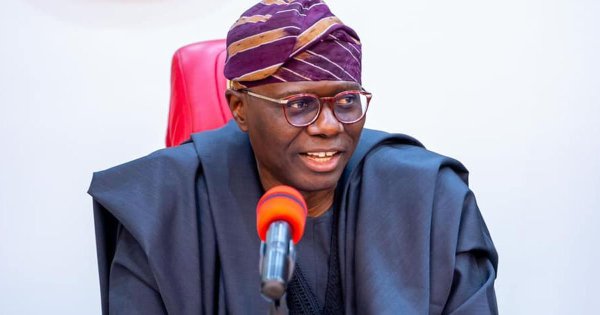

Lagos confronts ‘Omo Onile’ syndicate, arrest 5
-
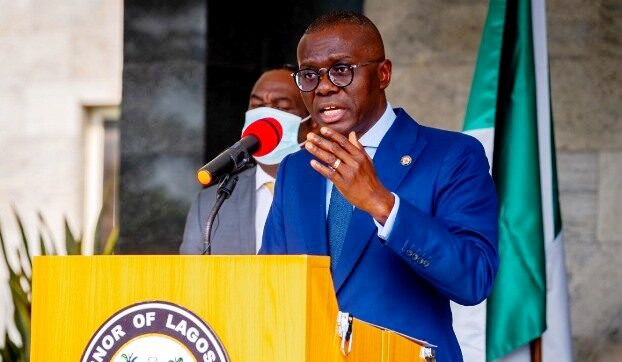

Collapsed 7-storey building: 5 bodies recovered; Lagos Commissioner resigns as Govern goes tough on developer
-
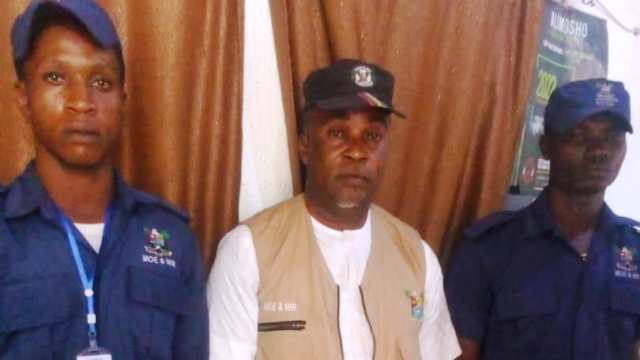

Lagos Recruits, Rehabilitates Street Urchins As Environment ‘Police officers’
-
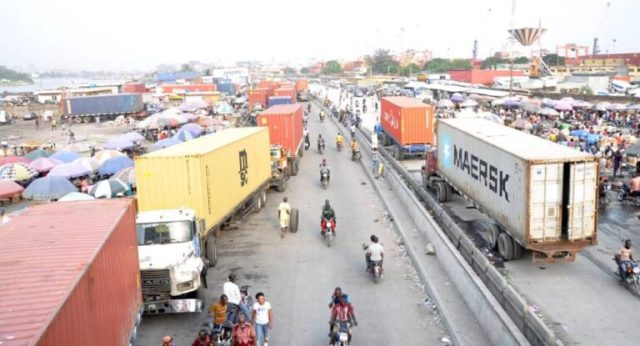

Era of “Lagos is no man’s land’ gone, says Omo Eko Pataki
-
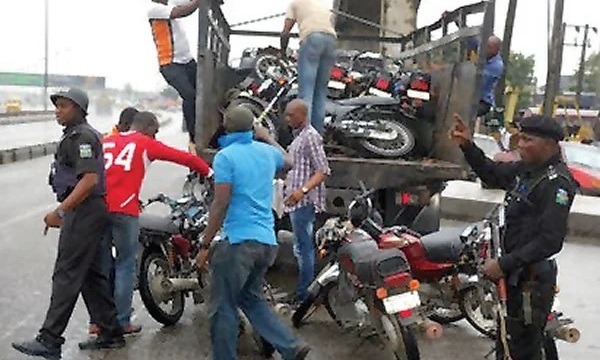

Lagos extends ban of Okada to four more LGs
-
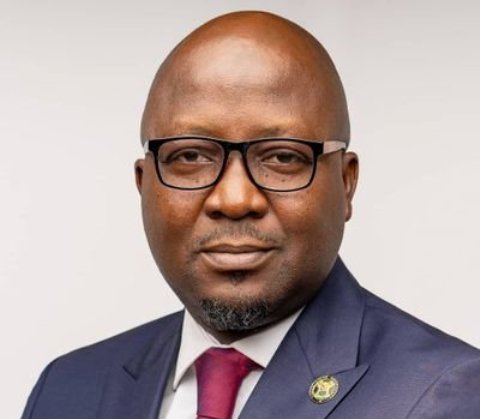

You Lie With Ease, Lagos state Govt Slams Peter Obi
Featured
Osun Politics: Aregbesola Grappling in The Dark Alley…
Published
2 months agoon
November 30, 2024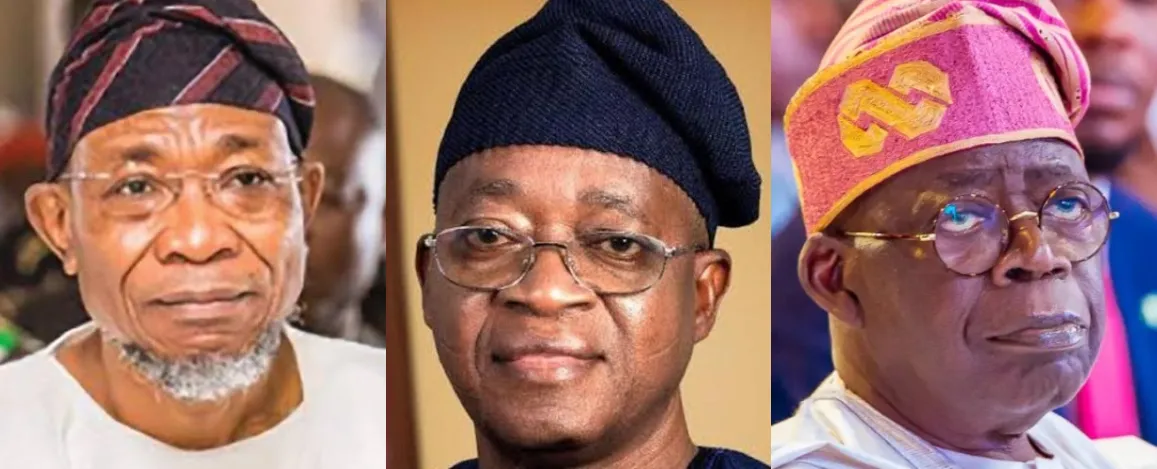
Battles Odds For Survival
Ogbeni Rauf Adesoji Aregbesola, an iconoclastic political strategist, a former Executive Governor of Osun State and also a former Minister of the Interior Affairs has bluntly refused to comment on the political turbulence he is facing both in his State, Osun, and Lagos, where he had a very strong hold on the political structure in Alimosho local government and more particularly, his well-publicized rift with President Asiwaju Bola Ahmed Tinubu.
But one of his right-hand man, who preferred anonymity in a matter of fact, declared that the “door to any reconciliation is closed, finally”.
The associate can actually feel undone by his party’s treatments of Ogbeni Aregbesola and his supporters. They were first expelled by the Osun State chapter in August 2023 by the State Executive Committee of the party.
The State Executive Committee had risen from its meeting and announced the suspension of another set of senior members believed to be supporters and followers of the one-time governor of the State and Internal Affairs Minister, Rauf Aregbesola. Prominent figures on the new list includes the former Secretary to the State Government, Mr. Moshood Adeoti, a former Speaker, Osun State House of Assembly, Hon. Nojeem Salami, a former member of the House of Representatives, who was the Senatorial candidate of the party in Osun East Senatorial District, in the last general election, Hon. Francis Famurewa, and a former Special Adviser to governor Aregbesola, Mr. Kunle Ige, and twenty-two other senior members of the party across the State.
But in a swift reaction then, Mr. Kunle Ige, had dismissed the suspension saying “it is irrelevant and stupid. They can’t even follow common due process. They are destroying the party.
I haven’t been home (Esa Oke) in ages. Since the last election, so where was the anti-party activity? I wasn’t even home (Esa Oke) for the last election. They don’t even think”, he queried.
According to Kunle Ige, the best thing is to “ignore them completely. I don’t have the time for their nonsense”
However, the gale of suspensions were alleged to be a direct response to the launching of the Omoluabi Caucus by the former governor, Aregbesola, in his country home in Ilesa.
While the suspension or expulsion of August 2023 seemed to have died down, another one suddenly erupted in October, 2024. This time around, Ogbeni Aregbesola himself was suspended from the party. And more, he was to face a disciplinary committee for his alleged infractions.
However, this is not the best of time for the political maverick, Ogbeni Aregbesola. His political trajectory from his time at the robustly influential Works Ministry in Lagos State, two-time Executive Governor of Osun State, and lastly, Interior Ministry overseer, attest much to his status as a charismatic grassroots political mobilizer; a man passionately loved by his people, but with an eccentric bend.
While he held sway in Lagos, he built a fortress around himself in the Alimosho local government, the celebrated largest local government area in the country. He controlled the political pulse of the area. And also, was the Alpha and Omega in the larger political empire of Asiwaju Bola Ahmed Tinubu. He simply filled the role of a “Mr. Fix It”. He was both de facto and de jure alta ego of Asiwaju Bola Ahmed Tinubu.
But presently, the man widely acknowledged as “Mr. Fix It” among the progressives clan is in a political quandary; he is simply at a political cross-road. His weird eccentricity has impacted much on his decisions and actions.
Now Ogbeni Aregbesola himself is in a fix politically. He is said to be nursing either a senatorial ambition from the Osun East (Ife/Ijesa) Senatorial district or if the new party in the offing comes alive, a vice presidential slot with Mallam Nasir El Rufai. But while he gropes for just anything to hang on to for safety in the dark alleys the bitter divorce with Asiwaju Bola Tinubu and the Bourdillion’s political family, has thrown him into, his supporters were still incorrigibly optimistic about his chances of clinging either of the two positions.
But the political road is dark, the coast is very bleak. He is very familiar with all the intrigues and cut throat shenanigans in political circle. He was the Lord in Tinubu’s political empire at a point. He knew the door to his familiar terrain in the All Progressives Congress (APC) might have been permanently shut against him. After all, he witnessed the door being shut against some of his erstwhile colleagues while serving as the Commissioner for Works and Infrastructure in Lagos State.
A member of the Governing Advisory Council (GAC) in Lagos State, who spoke to our correspondent, asked rhetorically recently in an interview with www.focusmagazineonline.com that “of the more than twenty Commissioners, who served under Tinubu with Aregbesola, how many can confidently raise their hands up and still stand by him?
He continued, “the downfall of these men were largely the scheming and shenanigans traceable to Ogbeni Aregbesola. Even the former Governor Akinwunmi Ambode would not forgive him in an hurry”, he said.
Now, the Apha Ogbeni Rauf, is in a quandary himself. He cannot break the barrier erected against him in Tinubu’s empire or APC. He finds it extremely difficult to co-habit with the uninspiring Adeleke Ademola in the Peoples Democratic Party (PDP), the Labour Party is an amnesia to him, yet he has the ambition of going to the Senate or running as a Vice President. Hence the option of a new political party. The new party according to proponents will be national in outlook and is expected to push both the ruling APC and PDP into the limits.
www.focusmagazineonline.com can recalled that Ogbeni Aregbesola, at a point was effectively, the de facto Asiwaju Ahmed Bola Tinubu’s alter ego. in the group, he decided what happened and who got what, in short, he called the shots. And in the words of an All Progressives Congress (APC) leader in Lagos State, the common refrain then in Bourdillion, Tinubu’s residence and political headquarters, was: “go and see Rauf”.
According to the member of the GAC, who preferred anonymity, whatever happened, or who got what or became what, be it in the Governing Advisory Council (GAC), the apex committee overseeing the affairs of Lagos State Government by proxy, were decided mainly by Ogbeni Aregbesola. He was said to have promoted, demoted, terminated, even truncated many political ambitions while his grips on Bourdillion lasted. His imprimatur were said to be everywhere. But not anymore.
Perhaps, his present travails allegedly started from his closeness, roles and actions as Tinubu’s alter ego. As the associate believed that “many around Asiwaju weren’t comfortable with Rauf being so close to Asiwaju… and thus sponsor and even encouraged the division”.
The first signal was the dissolution of the Mandate Group in Lagos. The Group was formed by the core loyalists of Bola Tinubu, the then Executive Governor of Lagos State. Ogbeni Aregbesola was largely in control. By 2017, he had installed his protégé, Alhaji Abdullahi Ayinde Enilolobo as the Apex leader. Suddenly the group, alongside others like Justice Forum and BATCO were dissolved by fiat by the party’s leadership.
However, Ogbeni Aregbesola’s followers in Osun traced his disagreements with the leadership of the Tinubu’s political hegemony to the succession politics in Osun State when his tenure as a two time Executive Governor was rounding up in 2017. Sources in Oshogbo, Osun State, Aregbesola was said to have insisted in having Alhaji Moshood Adeoti, from Iwo Local Government of Osun West Senatorial District as his successor. Thus he plainly explained to Tinubu. But Tinubu was alleged to have preferred his cousin, Mr. Adegboyega Oyetola from Iragbiji, in Boripe Local Government Area, Osun West Senatorial zone of Osun State. From this point, the loggerhead between the two political gladiators was said to have taken its roots. Asiwaju was said to started distrusting Ogbeni and started “feeling that he was becoming a threat to his ambition”.
Aregbesola was said to have grudgingly accepted to work for Gboyega Oyetola at the polls during the 2018 out of circle governorship election in Osun State. Oyetola had emerged victorious after a most rancorous election ever that ended with re-run in four words of Ile Ife, Orolu, and Oshogbo returned him with a margin of less than 500 votes.
In the said election, Aregbesola’s anointed candidate, Moshood Adeoti with hordes of his supporters had mass-moved into another political platform, the Action Democrats Party (ADP). Alhaji Moshood Adeoti cornered the over fifty thousand votes from the Iwo axis, but performed poorly in all other local governments. He came a distant fourth behind Oyetola, Adeleke, and Omisore.
Aregbesola, the master political strategist, took good notice of these returns from the elections. He waited patiently, observing the various take home from the off-cycle election, while looking for the right time to strike. He needed to exact his revenge and teach his former leader some political lessons.
The former eccentric governor started his vengeance war with the ministerial nomination for the State. He was said to have stunted both the nominations of Asiwaju Bola Tinubu and another elder of the party, Chief Bisi Akande, to emerge the Interior Affairs Minister during the second term of former President Muhammadu Buhari’s tenure. He was alleged to have used another eccentric political strategist up North, Mallam Nasir El Rufai to clinch the slot. With his emergence as a Minister, he was said to have clearly drawn the battle line with his political block. And from there, he brooks no odds. He started creating his platform, well outside the Bola Tinubu’s or APC’s blocks.
First step was the launching of the True Osun Progressives group (TOP), then the Omoloabi Forum within the State APC. These groups were essentially made up of notable foot soldiers of APC in Osun State, but who were fiercely loyal to Ogbeni Aregbesola. The twin group quickly spread across all the thirty-three local governments in the State. The State Government under Mr. Oyetola was said to have been seriously rattled by the emergence and spread of TOP in the State. The party also panicked. Known members of Aregbesola’s government were the leaders.
While the newly formed TOP and Omoluabi groups could not wrestle the governorship ticket from Oyetola during party’s primary leading to the 2022 off-cycle governorship election in the State, they quickly drew back and withdrawn from the party’s activities. When they re-emerged, it was with the opposition candidate, Mr. Ademola Adeleke.
The experience of the 2018 election that pitied Aregbesola’s candidate, Alhaji Moshood Adeoti of ADP with Iyiola Omisore of SDP, Jackson Adeleke of PDP and Oyetola of APC together has taught the maverick political strategist a lesson. Obviously, Adeoti cannot pull through if fielded again. Then his next move was shocking. Aregbesola and his troops decided to deployed their political weight behind Ademola Adeleke of the Peoples Democratic Party (PDP). He won.
Not many people were fooled when known acolytes of the former Minister started mobilizing for Adeleke. APC made faint attempt to mend fences. But it was rather too little or too late or both. Efforts by notable personalities, including the renown cleric, Papa Enoch Adejare Adeboye, an Ifewara Ijesaland born General Overseer of the Redeemed Christian Church of God, (RCCG), the Ooni of Ile Ife, Oba Adeyeye Enitan Ogunwusi, and others ended with naught.
Responses to all these attempts to thaw the raging rift were not encouraging. It was apparent by the body languages of the main actors that the two main combatants are done with each other. Asiwaju Bola Ahmed Tinubu seemed apparently, tired of Rauf Adesoji Aregbesola and vice-versa. Nothing seemed pulling the mutual confidence again. Aregbesola became bitter, enraged. And he let loose his anger, albeit, without restrain.
On the day of the election, the Minister was out of the country but apparently was keenly watching and monitoring events from home. But very early the second day, while the results started pouring in and Adeleke of PDP was edging Oyetola clearly in all the local governments, someone in his team haphazardly released a tweet that not few consider irrational. Although the tweet was quickly pulled down and disclaimed, certainly not a few had saved, or screenshot it. The “Osun Le Tente” tweet (Osun on top) will remain in the remembrance of many leaders for a long time to come.
Also, in the lead up to the APC’s presidential primaries, where thirteen aspirants slugged it out with Tinubu for the Presidential ticket, although Aregbesola was not in the fray, yet his hands were prominently seen and felt throughout the campaign.
While the campaign was gathering steam, Aregbesola was in Ijebu Jesa. He needed to meet his TOP members. A woman loyalist who claimed she attended the well-attended meeting recalled to www.focusmagazineonline.com the hard words he deployed while describing Bola Tinubu.
This many damaging rumours that later emanated from the Ijebu Jesa’s meeting apparently hurt Bola Tinubu and his supporters to no end. It was at the period when a picture of him was trending. He had visited a former Military President in his residence in Minna and the paramount ruler of Ijebuland, Awujale of Ijebu Ode, Oba Sikiru Adetona, when for whatever reasons, a patch of wetness was observed on his lower backside when standing up. This was translated by detractors to mean uncontrollable blader, an illness often associated with old age or panicking.
However, Ahmed Tinubu would eventually emerged the winner of the election and inaugurated the sixteenth President of the Federal Republic of Nigeria. And ever since Aregbesola has been in the political wilderness, operating on a thin thread, occasionally test running various strategies to reestablish himself.
He has been seen variously hobnobbing with the government of Ademola Adeleke, the Osun State Governor, and also, had appeared in open drive along major streets both in Oshogbo and Ilesa. But these political stunts were not enough to fetch him any huge dividends.
But while all seemed stable a bit, the Osun State chapter of the APC slammed him with a suspension, over allegations of anti-party activities. The suspension, which takes immediate effect, is pending the outcome of disciplinary proceedings initiated by the state’s party leadership.
The decision to suspend the former Governor followed a request from the Ilesa East Local Government APC Executive Committee, which petitioned the state party chairman, Tajudeen Lawal, to take action against Aregbesola, citing his alleged involvement in actions that undermined the APC as a party.
The committee, in a letter, accused Ogbeni Aregbesola of promoting factionalism and colluding with opposition parties, among other allegations.
Responding to the request, the Osun State APC Executive Committee notified the party’s national leadership, represented by APC National Chairman, Dr. Abdullahi Ganduje, of its decision to suspend Aregbesola and to establish a disciplinary panel to investigate the charges.
The resolution, dated October 22, titled “Resolution Suspending Rauf Aregbesola for Anti-Party Activities and Constituting a Disciplinary Committee,” was signed by Osun APC Chairman Lawal and Secretary Kamar Olabisi. The document outlined the allegations and Aregbesola’s suspension based on Article 21 of the APC Constitution.
“Following complaints of anti-party activities levelled against Ogbeni Rauf Aregbesola by the Ilesa East Local Government Executive Committee, the State Executive Committee (SEC), after reviewing the allegations and in accordance with the powers vested in it by Article 21(3)(vi)(c) of the party’s Constitution, hereby suspends Ogbeni Rauf Aregbesola from the party pending the outcome of an investigation,” the statement partly read.
The charges against Aregbesola include, factionalizing the APC by forming the Omoluabi Caucus splinter group; allegedly collaborating with opposition parties to destabilize the APC in Osun State; publicly criticizing party leaders, including President Bola Tinubu, Chief Bisi Akande, and former Osun Governor, Gboyega Oyetola; refusing to participate in or support APC activities within the state; and refusing to vote for the party since the 2019 general elections.
The committee will deliver its findings and recommendations to the state executive within 14 days. It also issued a formal notice to Aregbesola, inviting him to appear and defend himself against the allegations.
In a follow-up letter dated October 24 and signed by Osun APC Disciplinary Committee Secretary, Waheed Adediran, the former governor was given 48 hours to respond to the allegations in writing.
Sources at the party’s secretariat in Oshogbo revealed to www.focusmagazineonline.com that the former Minister had simply spurned all the letters sent to him.
When www.focusmagazineonline.com contacted him on his WhatsApp contact, for an interview, he simply reply “Thanks. No, please”
Many of his men who were suspended by the Osun chapter of APC however, denied receiving any letter of suspension from the party.
His men in Alimosho, Lagos State were also not willing to talk to the press. Alhaji Abdullahi Ayinde Enilolobo, his man Friday, refused to talk nor comments when contacted. He did not reply to all our messages to him.
But his troops in Osun State are boiling, not relenting in stating his case. Mr. Kunle Ige too was suspended by the party since August of 2023. But he told www.focusmagazineonline.com then that he was not aware of his suspension as he was not officially served any letter suspending him from the party.
However, many of the associates of the former Governor in Oshogbo were particularly irked by the recent developments. One of them, a former senior official of Ogbeni Aregbesola’s government revealed to www.focusmagazineonline.com that he was part of all the reconciliatory efforts to douse the tension between the two combatants, President Bola Tinubu and Ogbeni Aregbesola. But he noted sadly that “it appeared he (President Tinubu) is no longer interested in having Aregbesola around him”
Blunt and bold to a fault, Kunle Ige refused to comment on the suspension of Aregbesola. “No comment on the suspension… that’s their business…”, he blurted out when contacted by www.focusmagazineonline.com.
On the plans by some of Aregbesola’s supporter to announce their new political home this December, a former aide declared that “Ogbeni has not categorically given anybody any date…. But obviously he has his plans for the future politically especially for Osun…. The talk of December is because there is a third party option being planned … which might come on stream then… and it is a national one”.
The aide declared the rumoured adoption of Labour Party (LP) as “rubbish… LP was never was on the cards..”.
When asked pointedly why was it difficult for Aregbesola and Tinubu to settle their rift, considering the fact that Aregbesola was the de facto leader of Tinubu’s political block before the fall out, he insisted that “you should ask Asiwaju that question…”
Another associate who spoke to www.focusmagazineonline.com explained further that it “took Ogbeni a while to realise that they had been waging a war against him since 2017..”
He denied that the feud had its roots in the Moshood Adeoti versus Gboyega Oyetola’s struggle for the succession of Ogbeni Aregbesola. He said “well… certain things are now coming to light that shows that they had wanted to cut him (Ogbeni Aregbesola) to size since then (2017). They just wanted him to finish his term and step aside”.
With a despairing note, he declared that “I think that door (to any reconciliation) is finally closed”.
According to him, “Asiwaju is not interested in any reconciliation, since if he ever was, this wouldn’t have been an issue”.
He revealed that he had “been deeply involved in the past in trying to resolve the rift, but clearly Asiwaju isn’t interested”.
In Osun State, not many supporters of Ogbeni Aregbesola is discreet, about his next political moves. A former local government chairman told www.focusmagazineonline.com angrily that “God willingly by December, our Symbol, Rauf Aregbesola, will unveil the new party we are moving to”.
He also declared that “the people in APC, especially Tinubu, doesn’t need him in the party again, likewise the Oyetola’s camp in Osun. So we leave their party for them”.
www.focusmagazineonline.com ©December 2024
Featured
4 youths Perish in River Osun after Granny’s funerals
Published
2 months agoon
November 12, 2024By
FocusMag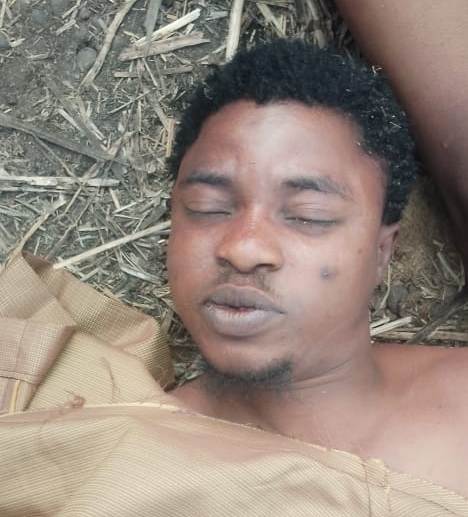
The tranquillity and calmness of the sleepy, but rustic community of Oke Imesi, Ekiti West Local Government, Ekiti State, were ruptured early Sunday morning when four young boys were mysteriously drowned in the River Osun, along the Oke Imesi, Ido Ile and Ikoro road.
The four young boys, aged between 24 and 27, were said to be in the town to attend the final funeral rites of the grandmother of two of them.
When www.focusmagazineonline.com correspondent visited the town, people were seen in groups discussing the ugly incident in hushed tones.
Generally, silence and unease calm pervaded the atmosphere, even up to the Palace of the traditional ruler, Owa Ooye.

Eye witnesses disclosed to www.focusmagazineonline.com that two of the boys, Mr. Gabare and an unidentified friend, had followed their friends, Mr. Samson Anisere and his cousin, Mr. Leye Adeoti, to celebrate the final funeral rites for late Mrs. Anisere, who hailed from Obanla Compound, Oke Imesi.
Our correspondent learnt that the boys decided to go and swim in the river around 11:45 am, since they had decided not to embark on the journey back to Lagos on Sunday. The funerals were done on Saturday, November 9.
All through Monday, the traditional institution of the town were busy with offering of sacrifices and performing all necessary rituals to appease the god of river and to prevent a reoccurring of such ugly incident.
According to tradition, the corpses must be bury by the bank 0f the river and must be done without delay.
Meanwhile, the remains of the four boys were buried by the river’s bank on Monday evening, after consultation with all the families of the bereaved and necessary police report obtained by the community.
www.focusmagazineonline.com ©November, 2024
Featured
Ilobu Community Mourns late COAS, Lagbaja, suspends celebrations
Published
3 months agoon
November 7, 2024By
FocusMag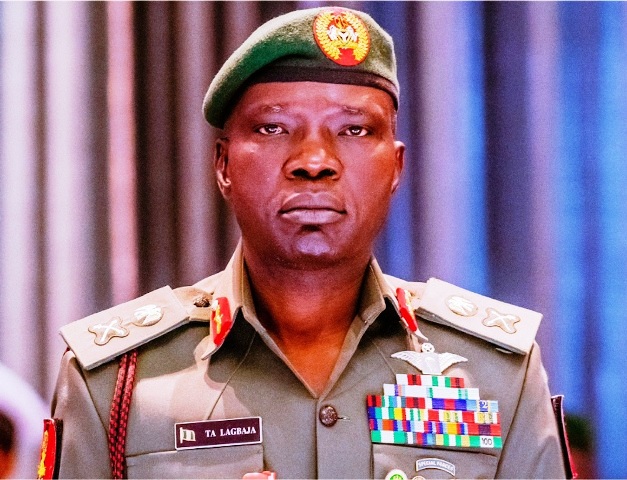
The passing of the immediate past Chief of Army Staff, Lt. General Taoheed Abiodun Lagbaja has thrown the ancient community of Ilobu, in Irepodun local Government area of Osun State into deep mourning.
“We are downcast and in sorrow. He is not just the son of the soil, but one of the shinning stars of the entire Yoruba race. If you go round the community, you will see a community that is in deep sorrow”, Oba Olaniyan muttered.
The community was in the thick of hosting the 2024 Ilobu Day celebration slated for November 9, when the sad news filtered in that their most prominent son, General Lagbaja has passed in in a private hospital in Lagos, Lagos State.
“Ilobu is a very happy town, but this morning, the sun suddenly snatched away from our sky.”
But in a twist, Oba Olaniyan told newsmen that the Ilobu Development Union executives had an emergency meeting, where they decided that Ilobu Day 2024 celebration be suspended indefinitely.
www.focusmagazineonline.com gathered authoritatively that President Bola Ahmed Tinubu spared nothing to save the live of the gallant infant Officer. He was said to have instructed that all necessary medical facilities should extended to him while on sick bed.
The traditional ruler of Ilobuland, Oba Ashiru Olaniyan, the hometown of late Lt. Gen. Lagbaja, was short of words when a correspondent of the Nigerian News Agency (NAN) visited his palace Tuesday afternoon, shortly after the confirmation of his passing by the Federal Government.
The traditional, who was seen in a deep mourning mood when the NAN correspondent visited his palace in Ilobu, directed the National President of the Ilobu-Asake Development Union, Oluremi Salako, to speak on his behalf.
He said that the town was planning its annual “Ilobu 2024 Day” slated for this coming Saturday (November 9) before the sad news of Lagabaja’s death filtered in.
www.focusmagazineonline.com © November 2024
Trending
-
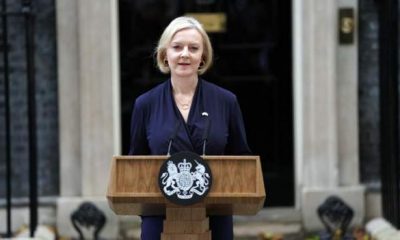
 Main Story2 years ago
Main Story2 years agoBREAKING: Liz Truss resigns as UK prime minister
-

 News2 years ago
News2 years agoSports: Messi misses out on Ballon d’or, Oshoala, Adeyemi in female, junior lists.
-
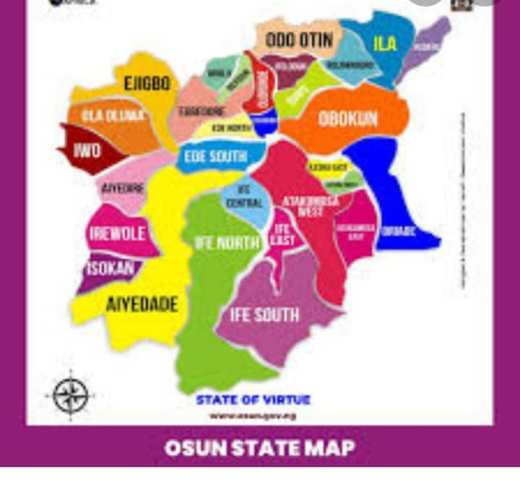
 Featured2 years ago
Featured2 years agoPolitics of Forced Congratulatory Messages Over Osun Guber Election
-

 Business2 years ago
Business2 years agoCurrency Redesign: Emefiele Unperturbed As Nigerians Groan in Pains
-
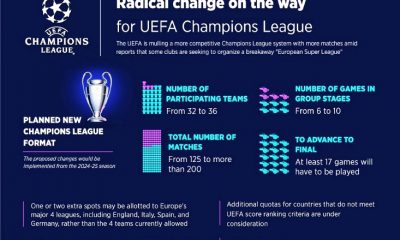
 Sports1 year ago
Sports1 year agoUCL format to change for 24/25 season: groups, knockout, league table
-
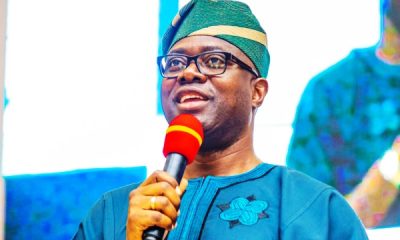
 Main Story1 year ago
Main Story1 year agoReal Reasons Makinde Refuses To Announce New Alaafin
-

 News2 years ago
News2 years agoBREAKING: Phyna is BBNaija season 7 winners
-

 Economy2 years ago
Economy2 years agoCBN’s Change of Naira Shocks Nigerians, EFCC Hail Moves Clampdown on Currency Hoarders
